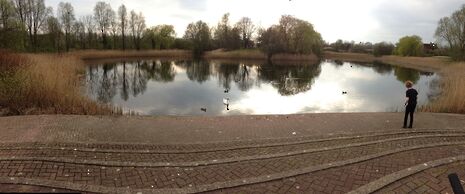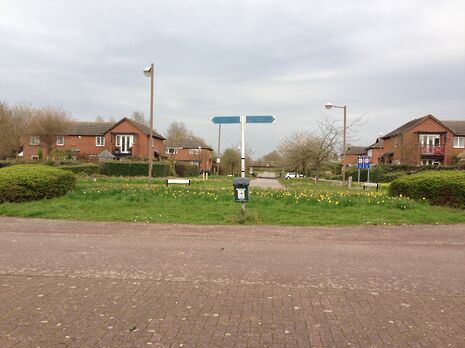Milton Keynes: the third culture town
Tired of hearing about how ‘industrial’ Milton Keynes is, Priyasha Vadera writes in defence of her hometown as it nominates itself for the City of Culture

You may be familiar with the term third culture kid, which refers to children who have been raised in a culture other than their parents’. Their current identity is an amalgamation of those cultures, sometimes combined in a way that makes them feel like they have no culture. In the same way, Milton Keynes is a third culture town (not city, the Queen wouldn’t grant us that status when she came to visit in 2007). Birthed from the need of a commuter town for London but styled to resemble living in a forest, Milton Keynes is urban, rural, and crucially, a third unique culture that comes from the intersection between the two.
From outside, Milton Keynes makes no sense. The city kids don’t think it is cool enough and the countryside folk say it’s simply too big to be considered rural – and they’d be right. It doesn’t fit neatly into the traditional categories of village, town or city and that confuses people. People stereotype what they don’t understand and, somewhere along the line, all the good stereotypes have been lost and the negative ones remain.
“It doesn’t fit neatly into the traditional categories of village, town or city and that confuses people”
I have three theories as to why some people believe Milton Keynes is a concrete monstrosity. One: those people have only ever changed train in Milton Keynes and have never properly been to Milton Keynes. Two: they have superimposed their idea of what a futuristic town should look like onto MK because they know it is a new town – but haven’t actually been here to see for themselves. Three: they have heard about the concrete cows and assumed everything here is concrete, again, without ever having seen the place. I’m convinced the only reason the concrete cows were pushed as the Milton Keynes mascot was due to someone’s naïve assumption that it would give us ‘culture’ and give people something else to latch on to other than the roundabouts.

It’s not that Milton Keynes has ‘no culture’ as some people claim; it’s just that is has a very different culture to everywhere else in the UK. When I first heard Milton Keynes had nominated itself for the European City of Culture, I’ll admit, I did laugh, but then I remembered that culture isn’t just museums and fancy architecture. Culture, as defined in the Oxford English Dictionary, is ‘the distinctive ideas, customs, social behaviour, products, or way of life of a particular nation, society, people, or period.’ There is a culture here: a culture of modernity, innovation and growing multiculturalism.
Culture means more than just old; although we don’t have the museums, tourist attractions and archaic architecture that other historic towns have, we have modern architecture, a theatre, countless cinemas, Bletchley Park – where Turing famously cracked the Enigma code – hundreds of shops, a ski-diving simulator and an indoor ski slope. There is an endless list of things to do here but Milton Keynes is considered the new kid on the block, still trying to prove it is more than just roundabouts.
“There is a culture here: a culture of modernity, innovation and growing multiculturalism.”
I know I am duty bound to defend the place where I grew up, but it baffles me that Milton Keynes offends so many people. When I was younger, I was convinced I would come back to Milton Keynes after university and live there forever. It just seemed perfect – trees everywhere, even inside the shopping centre, 24-hour supermarkets five minutes away and all of my friends in cycling distance. Everything was so convenient. I never thought that I’d get to university and people would be embarrassed on my behalf for having come from Milton Keynes.
Just because the town itself was planned doesn’t mean the people who live there are soulless London commuters, brainwashed like people from a dystopian plot. We are real and we have feelings that get hurt when the opinions of people who have never been here are worth more than that of people who have lived here our entire lives. Coming from Milton Keynes is what makes me British and is a strong part of my cultural identity, so when someone says my hometown has no culture, there’s an implication that I am not cool and cultured enough compared to everyone else.
From my perspective, it’s truly hard to imagine what people dislike about Milton Keynes. Do they dislike being able to take their dogs on a walk through fields just round the back of the house? Is having a local shop, doctor’s surgery, dentist, pharmacy and school within walking distance too convenient for them? Do they resent having 24-hour access to the supermarket? Is the ease of cycling on a redway, separate from the road, not thrilling enough? I understand that all these things are untraditional, but that doesn’t mean they don’t have value. Milton Keynes has been brave enough to break the norms and define a new way of living. Maybe the reason people dislike Milton Keynes is because liking it would mean admitting that there is another way of living, different to their own, that works.
So, yes, it is a bit of a joke that Milton Keynes nominated itself for the European City of Culture. Is it really a soulless concrete jungle of roundabouts and no culture, though? No – and not just because of the 20 million trees. It’s home; and wherever people are, there is culture
 News / Night Climbers call for Cambridge to cut ties with Israel in new stunt15 April 2024
News / Night Climbers call for Cambridge to cut ties with Israel in new stunt15 April 2024 News / Police to stop searching for stolen Fitzwilliam jade17 April 2024
News / Police to stop searching for stolen Fitzwilliam jade17 April 2024 News / Cambridge University cancer hospital opposed by environmental agency12 April 2024
News / Cambridge University cancer hospital opposed by environmental agency12 April 2024 Interviews / In conversation with Dorothy Byrne1 March 2024
Interviews / In conversation with Dorothy Byrne1 March 2024 Features / Cambridge’s first Foundation Year students: where are they now?7 April 2024
Features / Cambridge’s first Foundation Year students: where are they now?7 April 2024



